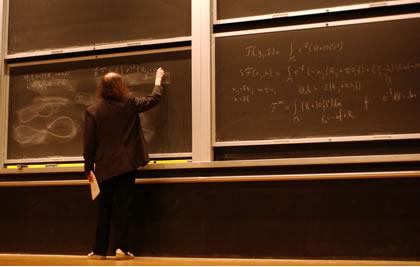Four mathematicians were today due to collect gold medals and glory in Madrid, Spain, having been declared winners of the 2006 Fields Medals — referred to as the 'Nobel prizes' of mathematics. But only three turned up.
Grigory Perelman, a reclusive Russian mathematician who was widely expected to be one of this year's winners (see 'Maths 'Nobel' rumoured for Russian recluse'), was indeed honoured at the opening ceremony of the International Congress of Mathematicians. But after a round of applause, president of the International Mathematical Union John Ball said "I regret that Dr Perelman has declined to accept." No explanation was given.
 Grigori Perelman declined to accept his Fields Medal.Celene Chang/The Daily Princetonian
Grigori Perelman declined to accept his Fields Medal.Celene Chang/The Daily PrincetonianPerelman's presence at the prize-giving ceremony, presided over by the King of Spain, was not expected. He was invited to give a plenary lecture, but never replied.
A UK newspaper, The Sunday Telegraph, reported on 20 August that it had tracked down Perelman to a flat in St Petersburg, where he reportedly lives with his mother. The mathematician is quoted as saying: "I do not think anything that I say can be of the slightest public interest. I have published all my calculations. This is what I can offer the public."
Nobel prizes have been turned down six times: twice by the winners, and four times because winners were forbidden to accept the award by their home countries. But the situation is unprecedented for the Fields medal.
Ball told Nature before the medallists were announced that it was unclear what would happen — to the money or the honour — if someone refused the award.
Multi dimensions
The Russian mathematician is believed to have proved the famous Poincaré conjecture in three papers posted online in 2002 and 2003. This seemingly simple conjecture notes that a sphere with a two-dimensional surface (as all spheres are in our normal experience) has the essential property that a slip-knot tied around any point of it can be pulled to a single point without cutting the string or breaking the sphere; a donut, in contrast, does not have this property. The Poincaré conjecture posits that there is a similar property for a sphere with a three-dimensional surface — but proving it has been tricky.
"Perelman's work is fantastic," says Michael Freedman, a mathematician who now works at Microsoft and was awarded the Fields Medal in 1986 for proving a statement equivalent to the Poincaré conjecture in four dimensions. The only downside to the work, he says, is the finality of it. "I did have a twinge of sadness. You like to see progress in the field, but you also hate to see a beautiful problem solved."
To explore the beautiful problem, Perelman used a mathematical tool known as Ricci flow, developing new tricks to study the deformation of surfaces. He is awarded the Fields medal, formally, "for his contributions to geometry and his revolutionary insights into the analytical and geometric structure of the Ricci flow".
His possible proof of the Poincaré conjecture has been the focus of fierce attention, both among mathematicians and in the media, but Perelman himself has withdrawn from the public's gaze.
Go for gold
ADVERTISEMENT
The other three Fields Medals were given to Andrei Okounkov, of Princeton University, New Jersey, Terence Tao of the University of California, Los Angeles, and Wendelin Werner of the University of Paris-Sud in Orsay, France, for bodies of work spanning statistical mechanics to patterns in prime numbers. The Medals are awarded once every 4 years to mathematicians no older than 40.
As well as a gold medal with the winner's name inscribed on the rim, the prize comes with about Cdn$15,000 (US$13,300).
Perelman may be due an additional prize from the Clay Mathematics Institute in Cambridge, Massachusetts, which offers US$1 million for the proof of the Poincaré conjecture as one of their Millennium Prizes. A decision has yet to be made by the Institute as to whether Perleman's proof stands up to enough scrutiny for this award. But even if honoured, if Perelman follows form he may not claim this one either.
Visit our nobelprizedeclinedby.html">newsblog to read and post comments about this story.
